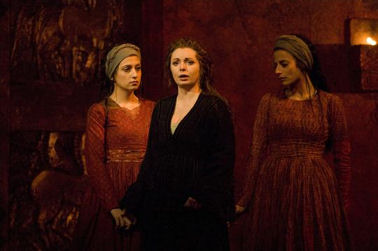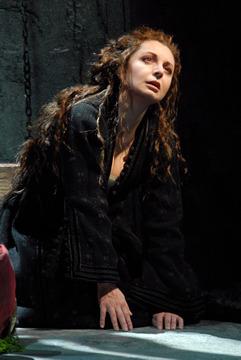Other Links
<Editorial Board
- Editor - Bill Kenny
- London Editor-Melanie Eskenazi
- Founder - Len Mullenger
Google Site Search
SEEN
AND HEARD INTERNATIONAL OPERA REVIEW
When
I have complained about one or another flaw in a performance, a
friend of mine, himself a conductor of no mean gifts, has sometimes
replied, “Oh, well, I go to hear the music, not the performance.”
That sounds like a splendid principle, a noble one even. But it
underestimates the effect performance can have on the impact a given
work, especially an unfamiliar one, makes on the listener.
I am coming to regard Nuccia Focile, a superb Mimi in last season’s La
Bohème (and to be heard again in next January’s Pagliacci),
as one of the most accomplished as well as versatile sopranos now
before the opera public. Her Iphigenia was a portrayal at once
majestic and searingly vulnerable, and–except for one palpably flat
note in the opening phrase of “Ô malheureuse Iphigénie,” the most
beautiful aria in the entire work–she sang with a wonderful blend of
subtlety and intensity, and with a power of tone all the more
remarkable for emerging from so petite and attractive a figure. The
two principal male characters in the drama, Orestes and Pylades,
brought comparably splendid assumptions from Brett Polegato and
William Burden. Polegato’s gleaming baritone voice, which I had
already admired in the Telarc recording of Vaughan Williams’s Sea
Symphony conducted by Robert Spano, rang out with compelling
vividness and passion, and in the interests of the story tenor
Burden, equally impressive in tone and line, managed a remarkable
visual transformation from the glamorous hunk I saw in a
Philadelphia production of Bizet’s Pearl Fishers a few years
ago. The other roles are less demanding; they were well taken by
Philip Joll as a neurotically blustery Thoas, Ani Maldjian and Leena
Chopra as priestesses, David Adam Moore as a Scythian minister, and
Michèle Losier as Diana, emerging as dea ex machina to bring
the plot to its unexpectedly happy conclusion.
Bernard Jacobson
Gluck, Iphigénie en Tauride:
Picture © Rozarii Lynch
Hearing, let us say, Beethoven’s Fifth Symphony, or any other piece
that I have heard dozens or even hundreds of times, I can certainly
make allowance for shortcomings in the work of conductor or
orchestra, and not lose my perception of the music’s stature. Where
Iphigénie en Tauride is concerned, however, my acquaintance
before this season was only through recordings. On that basis, I had
formed the view that it was a somewhat one-dimensional work. I could
not understand why many critics regard it as Gluck’s greatest
masterpiece. To my ears, it ranked nowhere near the earlier-composed
Orfeo ed Euridice. Fancifully perhaps, comparing the Gluck of
Iphigénie with the achievement of Handel in many of his
operas, I thought of a relation much like that of Dickens and
Trollope among 19th-century English novelists–the first figure in
each pair brilliant at evoking dramatic tension and local color, but
lacking, in music or in prose, Handel’s and Trollope’s ability to
create genuinely rounded and believable human beings.
It is thus greatly to the credit of conductor Gary Thor Wedow,
director Stephen Wadsworth, and their colleagues that this
presentation of Iphigénie for the Seattle Opera, a
co-production with the Metropolitan Opera, revealed it as a far
stronger work than I had suspected. Drawn largely from the ranks of
the Seattle Symphony, the orchestra played with irresistible élan,
and Wedow succeeded in eliciting, from their modern instruments,
sonorities very much like the best to be heard from period
instruments, without any concomitant damage to intonation. The
chorus was by turns thrillingly spirited and emotionally touching.
And the solo cast was already, on opening night, deeply impressive
both in dramatic conviction and in vocal strength.
Nuccia Focile Picture © Bill Mohn
The production team marshaled the stage and the forces on it with
much imagination. The interactions of the various characters were
vividly delineated in demeanor and gesture, and literalism was
notably avoided. One especially telling sortie into the theater of
the mind was the re-enactment of the murder of Agamemnon by
Clytemnestra, which brought it as sharply into focus for the
audience as it must have been in Orestes’s tormented mind.
Thomas Lynch’s sets, re-creating the temple of Diana, was gorgeous
to look at. It also featured, however, elements that were among the
less satisfactory aspects of the production. The main hall of that
temple occupied only about two-thirds of stage left. To house left
were first an ante-room–sensibly enough, and usefully for the
purposes of the action–and then a sort of outdoor alley that was the
reverse of useful. Wandering about in this space at the start of the
opera, several persons (two of them, I presume, Orestes and Pylades)
and some changes of lighting served only as a distraction from
Iphigenia and her fellow priestesses in the temple itself.
Augmenting the distraction was the injection of an ungainly stylized
pas de quatre in front of the altar. Ballet certainly has a
vital place in French opera, but it should not be allowed to dilute
the force of the sung action.
My remaining unfulfilled desire was for rather more variety in the
dynamic level of the music. Almost the whole score was rendered at a
minimum of mezzo-forte, though it’s true that the few quiet moments,
when they came, as with one or two magical pianissimos from Ms.
Focile and with some of the more reflective choruses, were all the
more effective for the contrast.
I still think Gluck’s Orfeo is a much greater work.
Commentators tell us how vividly Iphigénie en Tauride
portrays the varied aspects of the characters it presents. But it
seems to me that, paradoxically, Gluck’s attempt to intensify the
drama by dispensing with secco recitative results not so much
in unity as in a certain uniformity of sound that is the enemy of
individual characterization. And in this work at least–where,
despite the beauty of “Ô malheureuse Iphigénie,” there is nothing to
rival the sheer heart-stopping sadness and the sheer ineradicable
personal-ness of Orfeo’s “Che farò”–the relative lack of truly
individual tunes of the kind that Handel put forth seemingly
inexhaustibly militates against our involvement with the inner lives
of the sorely tried and tortured persons of the story. In a word, it
is plot that drives both Gluck and Dickens, just as it is character
that drives Handel and Trollope. At the end of the evening,
nevertheless, I came away with a much healthier regard for this
opera than I had before, and I congratulate Speight Jenkins and his
admirable company on that result.
